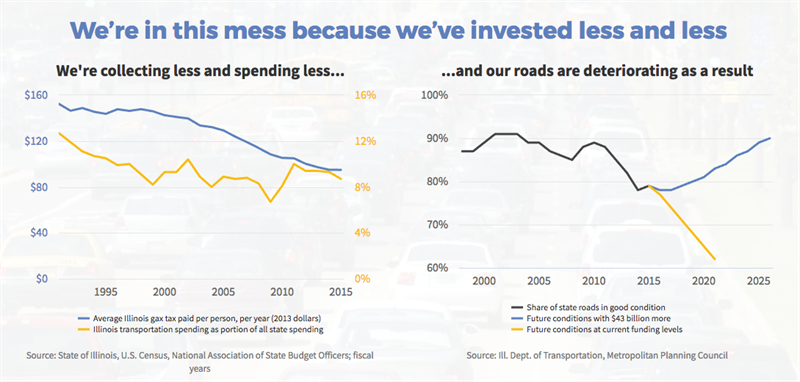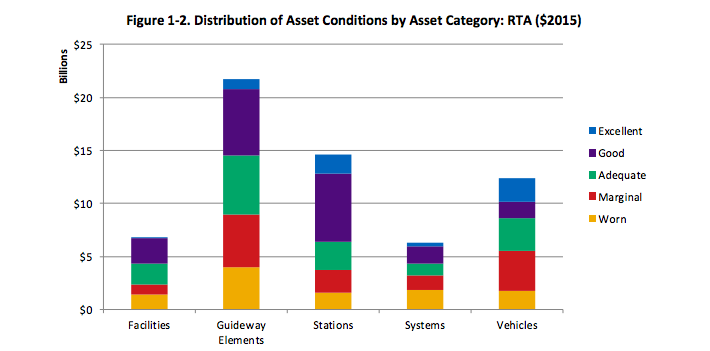The July 22, 2017 Let’s Get Excited about Maintenance New York Times Opinion Piece by Andrew Russell and Lee Vinsel highlights a fact about the transportation system that most people do not know or acknowledge: the vast majority of transportation funds are used to maintain what we have, not to build anything new. In Illinois more than 80 percent of transportation funds go to maintenance. And we are not even keeping up. According to MPC’s recent calculations, we have a backlog of $34 billion in maintenance of existing assets. And if we don’t increase our level of investment, things are going to get worse—fast. For proof, check out these graphs.

Nearly one third of transit infrastructure in Northeastern Illinois is not currently in a state of good repair. That means that tracks, stations, railcars and buses are older than they were designed to last. And we continue to limp along. For example, Metra’s Capital program for 2017 includes rehabilitating railcars built more than 40 years ago, last rehabbed in the 1990s.
People expect a functioning, reliable multimodal transportation system. But the reality is that we are just not spending enough to get that. The potholes, slow zones and bus breakdowns are not something we have to accept. To get Illinois to an acceptable standard we need to spend more money on transportation. The state gas tax has not been raised since 1991, and the purchasing power of this revenue has decreased by more than 40 percent.
It’s time to take immediate action such as raising the gas tax and/or vehicle registrations in the short term and researching other longer-term solutions for sustainable transportation revenue. There is no Federal infrastructure legislation expected anytime soon, so it’s up to us to fund the transportation we need.
To get Illinois to an acceptable standard we need to spend more money on transportation. The state gas tax has not been raised since 1991, and the purchasing power of this revenue has decreased by more than 40 percent.
The huge transit failures in other cities are a warning signal. New York City transit has suffered massive failures this summer. Multiple train derailments in recent years have affected infrastructure managed by MTA, Amtrak and NJ Transit, affecting millions of passengers.
Once the jewel of metropolitan transit systems, the Washington Metropolitan Area Transit Authority’s Metro rail system’s deferral of maintenance has reached a critical state, resulting in severe safety outcomes. Metro tried to catch up by implementing the SafeTrack accelerated maintenance program last year with an infusion of $150 million in emergency funding. This program conducted three years of maintenance in one year by temporarily closing individual or groups of stations to perform extensive repairs, which has been a huge inconvenience to riders. Some may never come back to transit after being forced to use other modes during the maintenance crisis. Remember, Metro was brand new just 40 years ago. That goes to show what severely underfunding maintenance will do. And the system is just barely working after this emergency repair—it really needs hundreds of millions more in investment.
The severe maintenance and performance problems of other systems are a warning for Chicago’s aging system.
The severe maintenance and performance problems of other systems are a warning for Chicago’s aging system. While as Mayor Rahm Emanuel highlighted in his recent New York Times op-ed that Chicago is more focused on maintaining what we have than expanding the system, we are still not spending enough on maintenance. According to the RTA 2016 Capital Asset Condition Report, the backlog for the three Chicago area transit agencies is more than $19.4 billion. Until we get the entire system’s maintenance current, reliability will be at risk. We must get the current system up to par before conducting any expansion projects. According to this figure from the Capital Asset Condition Assessment Update of 2016, guideway elements and vehicles have the large proportion of assets in marginal condition and may need the most attention.

Regional Transportation Authority
Keep in mind what it means to have unreliable and insufficient transportation. When people can’t get to work on time reliably the impacts can be serious—if hourly workers are late more than a couple of times they may be fired. When people spend more time frustrated in congested traffic, air quality goes down and stress goes up. Businesses cannot move freight to stores when they cannot move their trucks—and that product you want at Target might not be there next time. When companies cannot get products to market reliably, Chicago becomes less competitive for business. When it takes excessive amounts of time to get around to do even basic errands people start to question whether their lives are becoming unmanageable. We need to do this. Nobody needs another reason to consider moving out of Illinois.